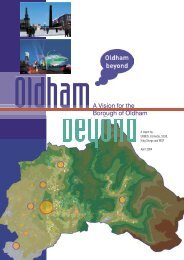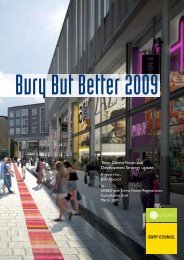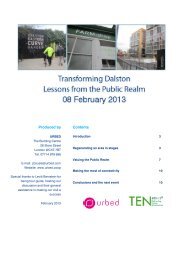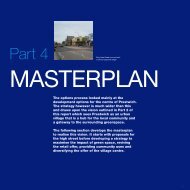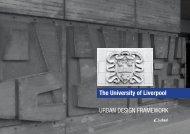Beyond Eco-towns Applying the Lessons from Europe - Urbed
Beyond Eco-towns Applying the Lessons from Europe - Urbed
Beyond Eco-towns Applying the Lessons from Europe - Urbed
Create successful ePaper yourself
Turn your PDF publications into a flip-book with our unique Google optimized e-Paper software.
2.0<br />
Introduction<br />
The starting point for this study was <strong>the</strong> UK Government’s proposal to promote up to ten <strong>Eco</strong>-<strong>towns</strong><br />
across England. These exemplar small new <strong>towns</strong> of 5,000 to 20,000 new homes are expected to<br />
deliver on a number of objectives which at first sight appear extremely challenging. They must achieve<br />
an absolute increase in housing numbers, create more affordable homes, achieve superb standards of<br />
design and sustainability and above all, not add significantly to public expenditure. This initiative also<br />
comes at a time when <strong>the</strong>re is a sharp downturn in <strong>the</strong> private housing market in <strong>the</strong> UK.<br />
At <strong>the</strong> time of writing <strong>the</strong> final selection of <strong>the</strong> locations for <strong>the</strong>se <strong>Eco</strong>-<strong>towns</strong> is yet to be made and <strong>the</strong><br />
precise criteria are still being drawn up. However, in o<strong>the</strong>r parts of <strong>Europe</strong>, such projects do already exist<br />
and are delivering sustainable homes and communities, in places which are delightful to live in and to<br />
visit. Moreover, <strong>the</strong>y are being built and occupied at a speed which is unheard of in <strong>the</strong> UK. How has<br />
this been achieved when we seem to find it so difficult? We regard <strong>the</strong> current slow-down in housing as<br />
an opportunity to stand back and look at not only <strong>the</strong> results but <strong>the</strong> processes behind <strong>the</strong> <strong>Europe</strong>an<br />
models. We also want to look beyond <strong>the</strong> immediate initiative and explore how such models might<br />
become mainstream, and not just unique beacons of excellence when <strong>the</strong> inevitable recovery happens.<br />
The authors have developed extensive knowledge and experience of successful, large scale <strong>Europe</strong>an<br />
housing developments through travelling to <strong>the</strong>m (in some cases, many times) and meeting <strong>the</strong> people<br />
who have made <strong>the</strong>m happen. We have also used <strong>the</strong> development of this report as an opportunity<br />
for ‘action learning’ with our sponsors and o<strong>the</strong>r key industry figures who have accompanied us on<br />
visits to Germany, Sweden and The Ne<strong>the</strong>rlands and have contributed <strong>the</strong>ir thoughts and reactions to<br />
this report. Although not generally labelled as <strong>Eco</strong>-<strong>towns</strong>, <strong>the</strong> places each exhibit many, if not all, of<br />
<strong>the</strong> characteristics suggested by <strong>the</strong> Department of Communities and Local Government (CLG) in its<br />
prospectus ii for new <strong>Eco</strong>-<strong>towns</strong>, including:<br />
• High environmental standards<br />
• Sustainable transport<br />
• Design quality<br />
• Community involvement<br />
• Employment opportunities<br />
• Healthy living<br />
• Efficient land use<br />
We have pooled our knowledge and have attempted to extract some key lessons which could inform <strong>the</strong><br />
development of <strong>the</strong> new <strong>Eco</strong>-<strong>towns</strong> (as well as o<strong>the</strong>r schemes that aim to achieve higher standards). We<br />
have been as interested in <strong>the</strong> ways in which <strong>the</strong> projects have been conceived, executed and financed,<br />
as in <strong>the</strong>ir physical form. We believe that some of <strong>the</strong> biggest differences and reasons for success lay<br />
in those areas which transcend urban design and planning, and stray into local political structures and<br />
methods of finance, procurement and management.<br />
10





